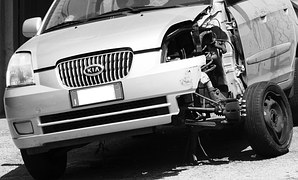If I Don’t Go To The Doctor Do I Have A Case?
“I was in a car accident. Do I have a case if I did not go to a doctor” ? As a personal injury and accident attorney, this is a question that I see with surprising frequency. I’ve represented the victims of negligence and injured workers for over 25 years. Every time I hear it, I find the query perplexing.
Of course you have to have a medically documented personal injury to have a personal injury case.
Now, of course if a vehicle is damaged, the owner may have a property damage claim, or other claims discussed in greater detail below. But that claim is wholly different and independent from the existence of a personal injury claim. The question seems to me to have its roots in two sources. The first one calls for a clarification of what the questioner means by “case”. The second involves a distinction in substantive personal injury and accident law between a legal wrong committed on or against someone, and the losses that result from that misdeed- or the absence of such losses. As Attorney Eric T. Kirk will tell you.

For example, in the wake of an automobile collision, there may be many types of claims that one could make. One might have a situation where their car is damaged and in need of repair. That individual would obviously have a claim for property damage against the at-fault party. In that same hypothetical situation, the individual with the damaged car might need to rent a car to get to and from work and other personal appointments while their car is being repaired. That person would have a claim for rental expenses. In the same vein, if the car is declared a total loss, there is obviously a claim against the at-fault driver for the fair market value of the car. Additionally, if the vehicle is business vehicle that the owner uses in his or her business, than they they may have a claim for lost profits. These are all claims, or “cases”, all of which could arise from the typical automobile accident.
However if the questioner means “do I have a personal injury case?” and they do not have a personal injury that has been documented by a medical professional, then obviously, and emphatically, there is no personal injury case to pursue.
While we have seen cases over the years where an individual that has not been evaluated by a doctor is successful in convincing a judge or jury that they suffered a minimal amount of inconvenience, pain or discomfort after an accident, and were awarded a small amount of monetary damage, this is an exceedingly rare and unusual scenario. It of course goes without saying that, if you were not injured in an accident, obviously you don’t have a personal injury claim -although you might have other types of claims [see above, e.g. property damage] arising from that accident. Moreover, if you don’t have an objectively verifiable injury as substantiated by a doctor or other medical professional, you likewise don’t have a personal injury case that has any real chance of success on the merits.

An additional reason for this type of question, in my mind, involves the lack of understanding of the concepts of legal wrong, as opposed to damages. Certainly, if someone drives their car into your car without cause, they have committed a legal wrong. Whether that is ultimately determined to be an act of negligence, or something of an intentional nature, such as an assault or battery, substantive personal injury law would clearly hold such conduct as being wrongful. You, as the person not at fault, are the victim of that legal wrong. Once that initial requirement is established, the secondary, and all important, question arises: are there damages that flow from that misconduct? If there are damages that are attributable to the misconduct, then the person has an actionable claim.
If there are no damages that are the result of the misconduct, then the person does not have an actionable claim- even though a legal wrong has been committed against them.
The idea of nominal damage is a concept in negligence and personal injury law that embodies this principle. When one has suffered a legal wrong, but does not sustain a loss, or is not damaged by virtue of that wrong, they are entitled to collect nominal damages of $1. Indeed, some courts award nominal damages in a case where it is determined that a defendant caused a motor vehicle accident, but a Plaintiff is unable to prove they were injured. However, if the person has sustained a loss as a result of that wrong, they have a claim against the at-fault party for money damages to compensate them for the loss. In the typical automobile accident case, if the only loss sustained was damage to a vehicle, then the wronged party has a claim for property damage. If the individual suffered a personal injury as a result of the car accident, then they additionally have a claim for economic and non-economic damages that flow from injury. If they did not sustain a personal injury, then they do not have a viable personal injury even though a legal wrong was committed against them.
It’s something that I hear a lot. “That guy hit my car. I want to sue him.” You certainly can if you sustained damage or a loss as a result of that accident. If you did not sustain a loss as a result of that accident- you don’t have a case. Or, to be legally precise, you have a case for $1.00 in nominal damages. In all but the most exceptional of cases, personal injuries must be verified, objectively, by doctors, to form the basis of personal injury cases. If you haven’t been evaluated by a doctor, who has diagnosed and injury, you don’t have a personal injury case.



